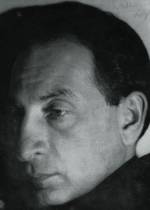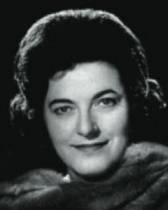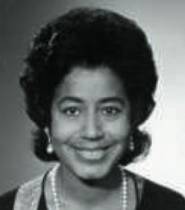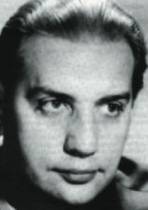
Walter Goehr (28 May 1903 - 4 December 1960) was a German composer and conductor. Goehr was born in Berlin where studied with Arnold Schoenberg and embarked on a conducting career, before being forced as a Jew to seek employment outside Germany, while working for Berlin Radio in 1932. He was invited to become music director for the Gramophone Company (later EMI), so he moved to London. In 1937 he conducted the London Philharmonic Orchestra in the premiere recording of Bizet's Symphony in C. As well as teaching composition in Britain, he also instructed pupils in conducting, one of whom was the young Wally Stott, later known as Angela Morley. In England he worked for the Columbia Record Company, and between 1945 and 1948 was conductor of the BBC Theatre Orchestra (the predecessor of today’s BBC Concert Orchestra); he was also a skilled arranger. He was one of many musicians of European origin and training recruited by Michael Tippett to the staff of Morley College. Goehr conducted many important premieres at Morley, including the first British performance of the Monteverdi Vespers of 1610. His first successful work was Malpopita in 1931, an opera especially designed for being broadcast. This work was scheduled for its first live performance on 6 May 2004, in Berlin, Prenzlauer Berg, Abspannwerk Humboldt. In 1942, he made a new arrangement of Mussorgsky's piano suite Pictures at an Exhibition, with a subsidiary piano part. In 1946, he arranged a number of Mussorgsky's piano pieces into the orchestral suite Pictures from the Crimea. In 1947, Goehr composed the music for the much acclaimed film Great Expectations, directed by David Lean. This was one of several films that Goehr composed music for. He was also well known as a conductor of film soundtracks including A Canterbury Tale, for which his friend Allan Gray had composed the musical score. In 1952 he conducted the first recording of L'incoronazione di Poppea, conducting the Tonhalle-Orchester Zürich in a live stage performance. The LP version was issued in 1954 and won a Grand Prix du Disque in 1954. He died in the City Hall, Sheffield, United Kingdom, on 4 December 1960, immediately after conducting a performance of Handel's Messiah.
 
Grace Hoffman Mattiwilda Dobbs  
Léopold Simoneau Heinz Rehfuss 
George Frideric Handel Messiah, HWV 56 (Mozart edition) Part I: The Annunciation
Scene 1: The prophecy of Salvation
Scene 2: The prophecy of the coming of the Messiah
Scene 3: Portents to the world at large
Scene 4: Prophecy of the Virgin Birth
Scene 5: The appearance of the Angel to the shepherds
Scene 6: Christ's miracles
Part II: The Passion
Scene 1: The sacrifice, the scourging and agony on the cross
Scene 2: His death, His passing through Hell, and His Resurrection
Scene 3: His Ascension
Scene 4: God discloses His identity in Heaven
Scene 5: The beginning of evangelism
Scene 6: The world and its rulers reject the Gospel
Scene 7: God's triumph
Part III: The Aftermath
Scene 1: The promise of redemption from Adam's fall
Scene 2: Judgment Day
Scene 3: The victory over death and sin
Scene 4: The glorification of Christ
Grace Hoffman, alto Mattiwilda Dobbs, soprano Léopold Simoneau, tenor Heinz Rehfuss, bass Orchestra and Chorus of the Handel Society, London Walter Goehr 04.12.1960† | 
